QuestionQUESTION: I've noticed the past week or two, my beardie's droppings have more fluid in them. I'm not sure if it's worse smelling than it should be, but then again it's not supposed to smell good...
He had 3 types of parasites back almost 2 months ago, which were treated... However his droppings never really looked a lot better. I took him in because the smell was just awful, and that kind of went away after the meds.
Now, 1-2 months later he's having diarrhea. I'm not sure if it's because of his diet or housing... I'll give you a small list of his everyday feedings and temperatures.
He gets as many dandelion greens as he will eat each day. He never ate veggies on a regular basis before but just got good about eating them the past month. This is when I started noticing different droppings. He also gets fed dubia roaches, which I feed dandelion greens to as well (for extra nutrition for him). He gets fed twice a day, about 8-10 per serving (16-20 roaches a day = 100 or so crickets nutritionally).
I dust the roaches 2 times a week.
He has the repti-sun 10.0 UVB that is on 12 hours day, and he's on tiles.
He is 5 months old, and 13 inches long, but doesn't seem to be growing fast anymore. He's filled out a lot though.
His cage is cleaned daily after he poops, and I sanitize and wash everything each time with hot water and a bleach/water solution.
I bathe him 2-3 times a week for about 10-15 minutes.
His temperature at the hottest spot can get to 105-110. He usually likes it around the 90-95 area.
His activity level hasn't changed. He's still very active, will run around, climb, jump... He eats very well, hasn't lost weight... So I'm very confused at what's causing his diarrhea. I don't want to take him back to the vet because I don't like the idea of him being medicated (again). It kills healthy bacteria... Plus, the meds should have cleared his parasites already.
Is it possible he's getting maybe too much vegetables and that's causing diarrhea? What can I try to change before taking him back to the vet as a last resort?
ANSWER: No, the veggies you are providing are good, though you should add some variety, and not feed just one thing all the time. Dandelion greens are excellent, but refer to some lists on proper greens for beardies, and add some of those as well. Maybe some mustard greens, turnip tops, etc mixed with the dandelion greens. Variety provides better nutrition. For insects, give him as many as he will consume in 15 minutes, and remove the rest--don't count them out, let him decide. In a month or two, he'll be ready to move to being fed insects just once a day, anyhow. As an adult, he will eat greens every day, and insects just twice a week.
While possible that the greens are the cause, the fact that he is not growing, when you are feeding him so much, means there might be other issues. Did the vet do a final fecal exam once the medication course was completed? Was everything disinfected carefully and kept scrupulously clean during the medication period? (Anything that couldn't be disinfected should have been discarded--parasite oocysts can be hard to kill, and they can pick them back up from the environment after the course is finished, if the environment wasn't carefully cleaned and disinfected with a bleach solution).
You shouldn't have to take him back to the vet--they have him on file there now, so you should be able to just take in a fresh fecal sample and have a test done to see if one of the parasites was not completely eliminated. Since a fecal check is not very expensive, it would be a good idea.
---------- FOLLOW-UP ----------
QUESTION: I cleaned everything in his cage with boiling water and a bleach solution (i soaked and scrubbed the branches though...) so I thought I had done everything. And no, they did not have him re tested after the medication. They gave him 2 separate doses within a 3 week period and that was it. They also had him come in each time to get his weight measured and that cost an additional $30. I've spent close to $100 so far so I'm a bit hesitate about taking him back to the same place. However, I will get a fecal done maybe at a new area, and monitor how he is over the next couple of days. Thank you for the help.
ANSWER: A new vet would be recommended, yes. It's not as though you cannot put the dragon up on a kitchen scale and check his weight yourself.
ARAV.org may help.
While $100 wouldn't be an unreasonable amount to spend for this issue, it should have been one vet visit, a fecal float test, a course of worming drugs, and then a second fecal float test afterward.
You said they found 3 different parasites? Which ones were they, and what did they prescribe for them?
A new vet, unfortunately, may require you to bring him in for an office visit, which costs more. If you don't trust the old vet to do a proper fecal float, I would go that route, however. If you think they're competent enough for that, I would just bring the sample into them and have them do it--if they find anything, then you can proceed from there. Have his records sent to a new vet, so they don't have to duplicate the test.
---------- FOLLOW-UP ----------
QUESTION: I will call them tomorrow and ask what they can do. We don't have many reptile vets around the area, and this is the one I was recommended to. I'll try to get a sample sent in on Friday.
He had coccidia, and i want to say trichamones and giardia. I'm almost certain that's what they diagnosed him with.
He was extremely healthy when I bought him from a breeder, but this all started when I had to buy him crickets from the pet store (I had run out of roaches). If he does have parasites again, what proper clean up should I do? I have a feeling he may have contracted them again from the branches since I didn't use anything besides boiling water on them. I soaked the tiles and rocks in hot bleach water so I thought I did what I needed. Any ideas?
And last... if he gets prescribed another dose, should I look into buying a probiotic? I want him to remain happy and parasite free and I've been reading that this is something to invest in for god bacteria levels. What do you think?
AnswerHere are some instructions on disinfecting: http://www.ehow.com/how_8629343_disinfect-bearded-dragon-cage-coccidia.html
I have heard that probiotics can be beneficial after parasite treatment. I'm not sure what research has been done into this, but people are using them and they don't appear to do any harm. Low level coccidia infection in bearded dragons is fairly normal, but when the animal is stressed, or has other parasites in addition (such as your had), they can get out of hand.
The treatment period you mentioned seems very odd to me. Normally, oral medication is given over a period of a couple of weeks.
Consider using plastic or resin fake branches, rather than real wood, as real wood cannot practically be disinfected. I suppose you could boil it for 15 minutes...that might work, if you had a pot big enough.
I recommend using a 'bare bones' cage setup during treatment--just a hide, water dish, and paper towels on the cage floor. Clean immediately when the dragon defecates, and disinfect every few days. Once treatment is completed, then you can return all the cage furnishings. It's a huge hassle, but the only way to get rid of some of these bugs for good.
Here is an excellent article from a bearded dragon owner on the whole issue:
http://www.reptileboards.com/threads/info-my-bearded-dragon-has-coccidia%E2%80%A
However, before you panic, remember that any change in diet may cause some digestive adjustments--it could still turn out to be the dandelion greens, although you shouldn't stop feeding them. A fecal screening will reveal the truth! (And should have been done as a matter of course, after treatment, by the vet...it can be tough to find a good reptile vet!)
If you feel like your vet doesn't know enough, and there aren't enough options, the best I can recommend is to educate yourself. If you know the basic ailments and what to look for, and the common treatments for those ailments, you can request your vet to do the right tests, and prescribe the right medications. I make specific requests of my vet when I take my snakes in--I ask for a fecal float, for example, to make sure they won't just do a smear. I request they take a swab and do a test if a snake has a respiratory infection, so they won't just prescribe antibiotics blind without testing for sensitivities.
It's sad that reptile owners have to do these things, but the AVA has only just approved a Specialist designation for reptile vets this past year or so, and as of yet, there are very few actual reptile specialists out there. http://www.abvp.com/categories_reptileamphibian.htm
Most veterinarians learn reptile medicine due to having an interest in it, but are not certified specialists in it. As a result, there are still vets practicing reptile medicine who know less about the specifics of it than the owner does! Nevertheless, they have the tools and equipment, the ability to run tests, and the prescription pad, so learning to work with them is necessary, when there are no other options.

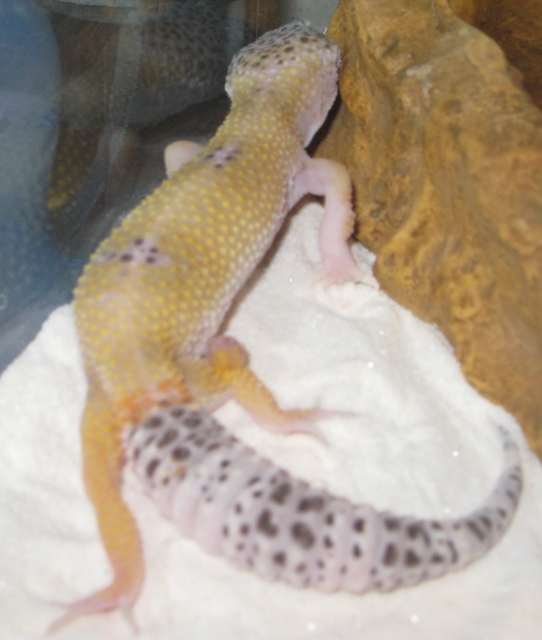 Leopard Gecko Bump On Knee?
QuestionEinstein
QUESTION: Hi there...we just br
Leopard Gecko Bump On Knee?
QuestionEinstein
QUESTION: Hi there...we just br
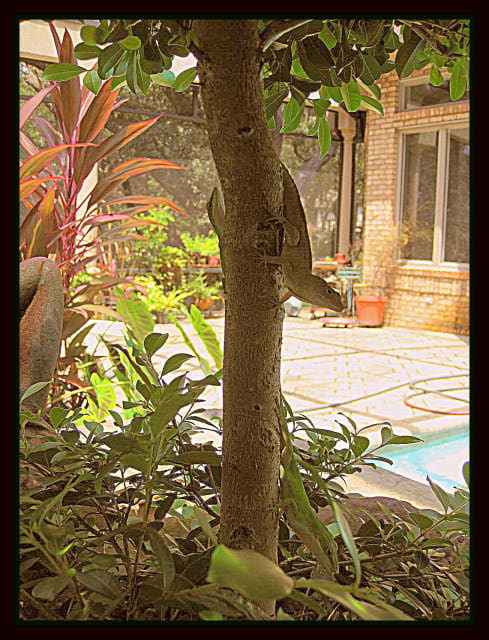 wild/not so wild green and brown anoles
Question
lizards "Pheobe"
Dear M
wild/not so wild green and brown anoles
Question
lizards "Pheobe"
Dear M
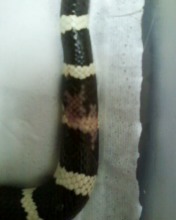 tea tree oil
QuestionQUESTION: I have a baby California king snake,
tea tree oil
QuestionQUESTION: I have a baby California king snake,
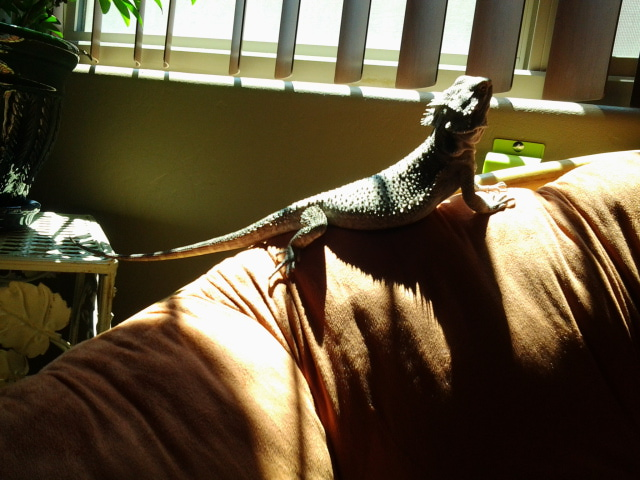 b.d eating habits
QuestionMulan
Mulan
QUESTION: Hello Traci
b.d eating habits
QuestionMulan
Mulan
QUESTION: Hello Traci
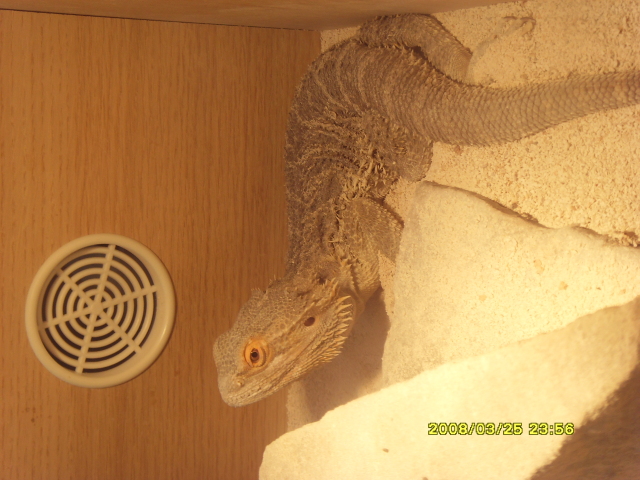 bearded dragon 2years old male
Question
spike
hi Sara i have adopted my friends beadie
bearded dragon 2years old male
Question
spike
hi Sara i have adopted my friends beadie